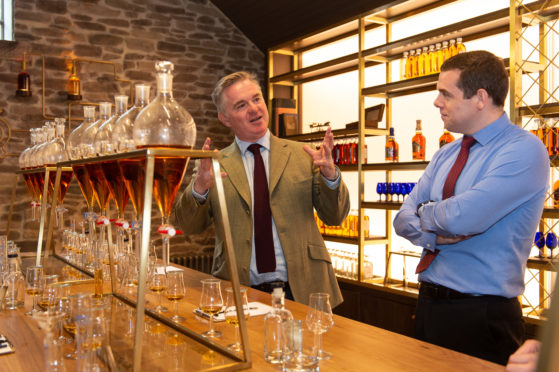A UK Government minister has insisted whisky will only become more important to the country’s economy after Brexit – despite the industry still awaiting the answers to key questions about how Scotland’s national drink will continue to be exported.
Scotland Office minister Colin Clark visited Strathisla Distillery in Keith yesterday, which is the home of Chivas Brothers, for talks with senior representatives from the sector.
Mr Clark explained that leaving the EU presented an opportunity for the country to negotiate separate trade deals and tariffs to prioritise the spirit.
Last year, whisky worth £4.7 billion was shipped overseas at an average of 41 bottles every second.
That represents a quarter of all the UK’s food and drink exports.
Concerns remain, however, within the Scotch Whisky Association that a no-deal Brexit could cripple the industry at a time when it is receiving huge investment to expand production and improve tourist facilities.
Mr Clark said: “Whisky will undoubtedly become more important because we will be able to set our own trade deals and set our own tariffs.
“Instead of negotiating as one of the 28, it means we can concentrate on our core industries. Whisky is our biggest single export.
“The other thing that is really important is Scottish barley and agriculture.
“It is so important that we connect food, farming and the drinks industry. They are integral to one another.”
Mr Clark stressed the logistics of exports had already formed part of the government’s planning in the event of leaving without a deal.
However, Karen Betts, chief executive of the Scotch Whisky Association, remains concerned a no-deal Brexit could have a drastic effect on exports.
She said: “We have a strong preference for a deal that would give us a transition period to reduce the cost and complexity of overnight changes.
“I think as an industry we are probably as prepared as we can be but there are some risks that are difficult to mitigate.
“How ports, customs and borders operate in the EU will be important to us.
“What happens with those critical agreements the EU has with non-EU countries where we benefit from zero tariffs or other benefits will also be important.”
Moray MP Douglas Ross added: “The particular challenges faced by the sector at present include the threat of retaliatory tariffs from the USA in response to EU aircraft subsidies.
“It’s clear how important this matter is for the UK Government and I know all departments are aware of the issue and will work to avoid this at all costs.”
